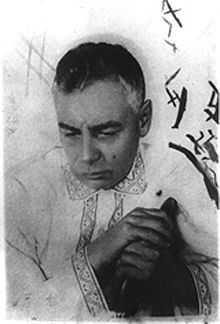Aleksandr Voronsky

Aleksandr Konstantinovich Voronsky (Russian: Алекса́ндр Константи́нович Воро́нский) (8 September 1884 [O.S. 27 August] – 13 August 1937) was a prominent humanist Marxist critic and editor of the 1920s, disfavored and purged in the 1930s.[1]
Early life
Voronsky was born in the village of Khoroshavka in Tambov Governorate; his father was the village priest, Konstantin Osipovich Voronsky, who died when Aleksandr was a few years old. After attending a Tambov religious school, in 1900 he enrolled in the Tambov Seminary, where he helped organize an illegal library for the seminary students. In 1904 he joined the Bolshevik faction of the Russian Social Democratic Labor Party, and the following year he was expelled from the seminary for "political unreliability". He moved to St. Petersburg, where he carried out party assignments and met Vladimir Lenin; in September 1906 he was arrested and sentenced to a year of solitary confinement. Soon after his release he was arrested again in Vladimir and sentenced to two years of exile; on his way to Yarensk in Vologda guberniya he met his future wife, Serafima Solomonovna Pesina, another young Bolshevik. After finishing his exile in 1910 he moved to Moscow and then Saratov, where he helped form a provincial group of Bolsheviks and organize a number of major strikes. In January 1912 he was one of 18 delegates to the Prague Party Conference, at which he took the minutes of the conference and spoke strongly for a mass daily workers' newspaper.[2] On his return to Russia he continued underground work and was rearrested on May 8; his exile ended in September 1914, when he returned to Tambov with his wife and newborn daughter, Galina, moving to Ekaterinoslav the following year.
Participation in the Bolshevik Revolution
When the February Revolution came, he became a member of the Odessa Executive Committee of the Council of Workers' Deputies and edited the local Bolshevik newspaper, Golos proletariya (Voice of the Proletariat). After the October Revolution, he helped the Bolsheviks take power in Odessa and in early 1918 moved to Saratov, Moscow, and then Ivanovo, where he assisted his friend Mikhail Frunze, edited the newspaper Rabochii krai (Workers' Land), and headed the provincial Party Committee.
Literary and political career
In January 1921 Voronsky left for Moscow, where he met with Lenin and Gorky to discuss plans for a new "thick journal" (the traditional Russian combination of literary magazine and political journal), which was called Krasnaya nov' (Red Virgin Soil) when the first issue was published in June. In 1923 he organized a new publishing house, Krug (Circle). In the increasingly fractured cultural-political scene of the early 1920s, Voronsky aligned himself with Trotsky and Anatoly Lunacharsky and opposed the growing power of Joseph Stalin, which led to his downfall in 1927, when he was attacked by the Party and the Russian Association of Proletarian Writers and in October relieved of his duties as editor of the journal. In February 1928 he was expelled from the Party, and in January 1929 his arrest was announced. However, he recanted his opposition and was readmitted to the Party and permitted to return to Moscow, where he continued to write and edit for Gosizdat but was no longer prominent as a critic.[3]
Expulsion and death
In 1934, American Max Eastman describes Voronsky's increasingly untenable position in a chapter called "Voronsky's Fight For Truth" in his book Artists in Uniform.[4] In 1935 he was again expelled from the Party, and on February 1, 1937, was arrested by the NKVD.[1] On August 13 he was sentenced to be shot and probably executed immediately after the sentence.[2]
Although Voronsky considered himself an orthodox Marxist, he was far from the ideological rigidity that was enforced after Stalin took control. Victor Ehrlich called him "flexible and humane" and wrote:
He combined political orthodoxy with a strong personal commitment to literature, a commitment underpinned by an aesthetic which, though not incompatible with Marxism, could be easily construed within the Soviet Marxist framework as a "bourgeois-idealistic" heresy. To Voronskij art was not primarily a matter of mobilizing or manipulating group emotions on behalf of a class-determined world view. It was a distinctive form of cognition, a largely intuitive mode of apprehending reality ... a true artist, armed by intuition and creative integrity, cannot help seeing and embodying in his work certain truths that run counter to his conscious bias and to the interests of his class.[5]
He therefore supported such "ideologically confused" writers as Boris Pilnyak, Konstantin Fedin, Vsevolod Ivanov, and Leonid Leonov and was one of the few Party critics to recognize the gifts of Isaac Babel: "No wonder Red Virgin Soil ... became one of the most vital and readable Russian periodicals in the 1920s."[6]
He wrote Za zhivoi i mertvoi vodoi (Russian text) (1927, 1929; tr. as Waters of Life and Death, 1936), "two fine volumes of memoirs."[7]
References
- ↑ 1.0 1.1 Brent, Jonathan (2008). Atlas & Co. Publishers, ed. Inside the Stalin Archives. New York, USA. pp. 194–200. ISBN 978-0-9777433-3-9.
- ↑ 2.0 2.1 A. K. Voronsky website
- ↑ Edward J. Brown, Russian Literature Since the Revolution (Harvard University Press, 1982: ISBN 0-674-78203-8), p. 156.
- ↑ Max Eastman, Artists in Uniform: A Study of Literature and Bureaucratism, (New York: Alfred A. Knopf, 1934) pp. 149-155
- ↑ Victor Ehrlich, Twentieth-Century Russian Literary Criticism (Yale UP, 1975), p. 20.
- ↑ Ehrlich, Twentieth-Century Russian Literary Criticism, p. 20.
- ↑ R.D.B. Thompson in A.K. Thorlby (ed.), The Penguin Companion to Literature: European (Penguin, 1969), p. 814.
External links
- A. K. Voronsky website
- A. K. Voronsky Archive at Marxists.org
|